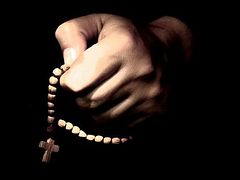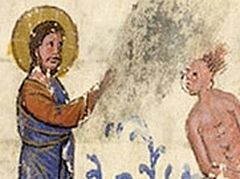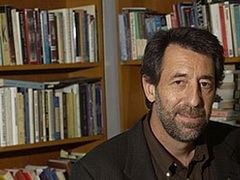In 1913, a small Russian fleet landed a contingent of soldiers who forcibly removed a group of Russian monks from Mount Athos. This action came at the end of a stormy controversy surrounding the name of God. The monks were known as the Imyaslavsy (“Name worshippers”) and were following ideas that had been promulgated in a text published in 1907. That work, On the Caucasus Mountains, written by the staretz, Schemamonk Hilarion, was a very popular work on the Jesus Prayer, and contained the statement, “The Name of God is God Himself.” The arguments surrounding the statement and the work itself reads like a who’s who of early 20th century Russian theological figures. Its greatest opponent was Archbishop Anthony Khrapovitsky as well as the bulk of the Holy Synod. Defenders included figures such as Fr. Sergius Bulgakov and Fr. Pavel Florensky. Interestingly, the topic has been brought up for re-examination in our own time.
All of this might sound like a storm in a tea cup, a battle over semantics, but it centered around the very important place of the Holy Name within Orthodoxy. It is easy to say, without fear of contradiction, that no group within Christianity holds greater reverence for the name of Jesus, in word and in practice than Orthodox Christianity. The most universal devotional prayer in Orthodoxy is the ‘Jesus Prayer’: “Lord, Jesus Christ, Son of God, have mercy on me, a sinner.” And those who teach the prayer always include the instruction that the devotional recitation of the prayer is to focus on the Name.
There are three texts in the New Testament worth noting in this regard:
God has given him a name which is above all names, that at the name of Jesus every knee should bow, of those that are in heaven, on earth, and under the earth (Phil 2:9-10).
There is no other name under heaven given to men whereby we must be saved (Acts 4:12).
Hitherto you have not asked anything in my name. …Whatever you ask the Father in my name, He will give it you (Jn 16:23-24).
Christian instinct has always had a sense that when the name of Jesus is invoked, Jesus Himself is invoked. There are countless Pentecostal choruses and Protestant hymns that extol the “sweetness” and the “power” of the name of Jesus. The Catholic Church celebrates the Feast of the Holy Name on January 3rd, though others in the West associate it with January 1st (the Feast of the Circumcision in Orthodoxy).
Taken in the wrong way, “The Name of God is God Himself,” is certainly heretical. That would be true were someone to say that an Icon of Christ is Christ Himself. However, the Church says that in an icon, the person (hypostasis) of Christ is truly present. According to St. Basil, “An image makes present that which it represents.”
It is at least the case that the Holy Name is a verbal icon of Christ. But it is also the case that it seems to be more than an icon. In the sacrament of the Eucharist, we believe that the bread and wine truly become the Body and Blood of Christ. The Orthodox are quite realist in such language. The elements of the Eucharist are treated in the most holy and reverent way possible, though there is not an Orthodox practice of “adoration” as a service in itself, as is practiced within Roman Catholicism. As it was explained to me, “Christ said, ‘Take eat.’ He did not say, ‘Take, look.’” And so we treat it with all possible reverence – and then consume it. The sacrament is reserved for the purpose of ministering to the sick or dying – but not for the purpose of adoration.
These are interesting waters within the theological life. The heart has an understanding that frequently defies our attempts at description. Perhaps the most serious charge (of substance) brought against the Imyaslavsy was that they were “innovators.” In saying, “The name of God is God Himself,” they were declaring something that the Church has not said. My own take on the matter is rather similar. Were I to hear such a declaration, I would immediately recognize a friend rather than an enemy. But something within me would hesitate and say, “Yes. But I don’t think that is quite the right way to say it.”
The danger associated with such a statement is that of making the name of God into a fetish, a religious object by which we seek power (or some such thing). The same charge, of course, was long ago brought against the making and veneration of icons and the Church refuted it – as heresy. There is a right veneration given to icons – and that veneration is important and salvific.
In the same manner, calling on the name of Jesus is essential in the Christian life. “There is no other name given under heaven by which we must be saved.”
This short passage from St. Basil the Great offers wisdom in the matter:
But if someone claims that it is written: “whoever calls upon the name of the Lord will be saved” (Jl 2:32 & Acts 2:21), and that therefore a Christian need only invoke the name of God to be saved, let him read what the Apostle has said: “How can they call upon him if they do not believe in him” (Rom 10:14). And besides this there are the words of the Lord himself: “Not everyone who says, “Lord, Lord”, will enter the kingdom of heaven, but only he who does the will of my Father who is in heaven” (Mat 7:21). Moreover, if someone is doing the will of the Lord and does not do it exactly in the way ordained or does not do it out of the proper motive of love for God, then all the effort he puts into the action is useless, and Jesus Christ himself has said in his gospel: “Hypocrites do these things as to be seen by men: I tell you truthfully, they have already received their reward” (Mt 6:16). It was in this divine school that Saint Paul learned the lesson which he taught when he said: “If I give away all my possessions to feed the poor and give my body to be burned, but lack charity it profits me nothing” (Cor 13:3).
This wisdom seems similar to the right-honoring of icons. The Church defended the making and veneration of icons and described precisely what was meant by veneration (it is not worship). Years ago, I wrote that it is necessary to venerate an icon in order to actually see it. Those who do not honor the one represented in the icon only see an object of art. But the icon exists within the relationship that is established through communion. I honor the icon of Christ, because I love Christ. How do I not love His image? How could I not love His name?
But consider for a moment an error too easily overlooked. The Name of God is not an idea. Honoring the name is more than pondering it my mind. Like an icon, the name itself has substance. It may be spoken, sung, written. We are told to “call upon the name.” We do not honor an abstraction, but recognize and honor a Reality that is itself present in the name. Those who attacked the Imyaslavsy often fall into this error, embracing a Nominalist view of reality instead. The name of God is real.
His name is sweet. It dwells within me and burns with Divine fire. It is a treasure given to me in my Baptism. It causes demons to flee and calms the wind and waves. It heals the sick and brings hope to all. It opens the gates of paradise. But this is true of the Name-in-communion and not as an object-in-separation.
Veneration is the primary means that brings us into true communion. It is love-extended-towards-the-other. It finds a huge variety of forms in the life of devotion – love is very creative in its expression. That God has given us His name is itself a revelation of the Incarnation. “Jesus” is a very human name, nothing other than the name “Joshua.” It was probably a common name. It still is. But it is also The Name when spoken by the heart of love. Above all names it bears the Savior and He deigns even to dwell on our lips.
Glory to God.








